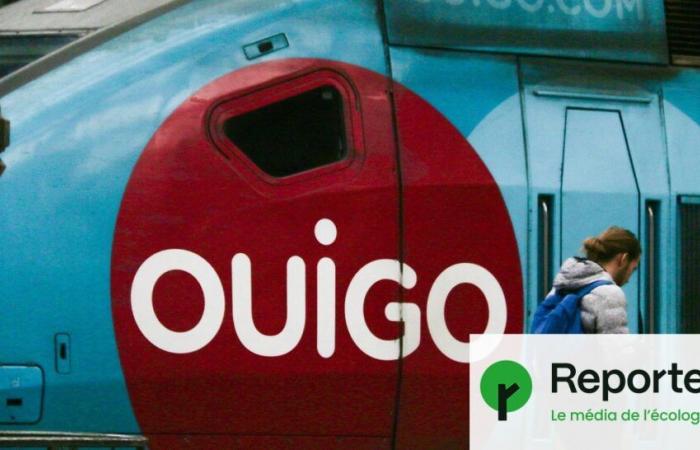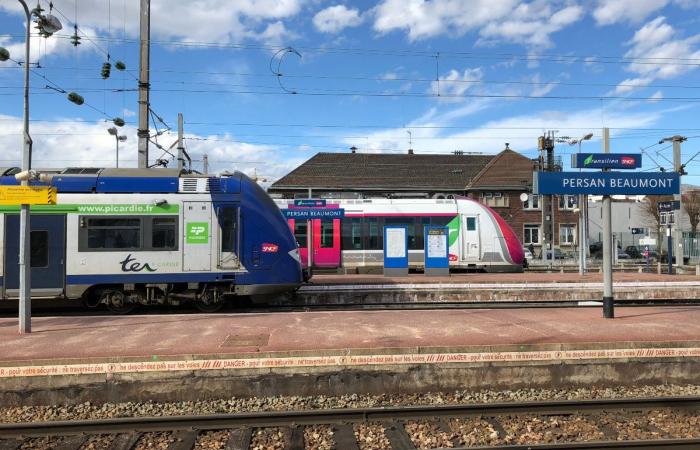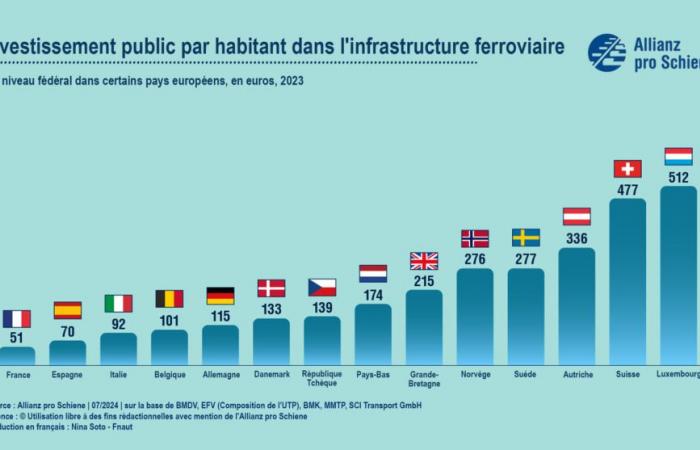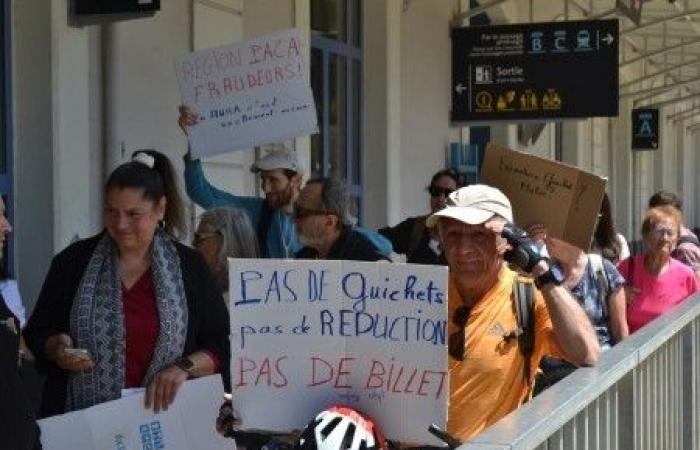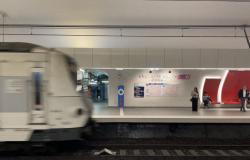Aleop, Zou !, Lio, InOui, Trenitalia… The railway landscape has transformed in recent years into an indigestible salad of logos. On the ticketing side, this joyful shambles leads to a lot of aberrations: ticket offices TER who do not sell tickets TGVdiscount cards that do not work in all regions, the application SNCF Connect which does not display any Trenitalia or Renfe tickets…
And this is just the beginning. The railway landscape risks becoming « insane », warns the president of the National Federation of Transport User Associations (Fnaut), François Delétraz. A concern widely shared in the small world of rail, including among unconditional supporters of opening up to competition: we are witnessing « an extraordinary fragmentation [qui pose] a huge concern »alarmed the very respectable president of the Transport Regulatory Authority, Thierry Guimbaud, during the annual conference of Afra, the lobby of railway companies, on October 8 in Paris.
« The situation is worrying », recognized the same day Claude Steinmetz, the boss of Transdev, the first challenger of the SNCF on the TER. According to his calculations, there are 45 different reduction titles for TERall regions combined. « The historical operator [la SNCF] has eleven distribution websiteshe added. How do you want us to find our way there? ? »
© Clarisse Albertini / Reporterre
This complexity, not really in line with the French enthusiasm for trains and the urgency to decarbonize transport, is a direct consequence of the opening of the rail network to competition. Big bang denounced by the railway unions, in particular through a call for a strike, starting on the evening of Wednesday, December 11.
The app war
Regarding the TEReveryday transport and the keystone of the energy transition in transport, the end of the public monopoly is managed by the regions. As they invest to try to improve the offer, they want this to be seen. « They have almost all commissioned communications agencies to find a brand name – improbable – to differentiate themselves from their neighbors while turning their back on SNCF and to his good old man TER »mocks Fnaut, on December 9 in a press release. Fluo, BreizhGo, Lio… Each also deploys its own pricing policy and its own reduction system.
In this jungle, several ticket sales applications like SNCF Connect or Trainline hope to establish themselves and promise to make the « customer journey ».
For the moment, they are waging a merciless war. Overwhelming leader, SNCF Connect (85 % of sales) refuses to sell tickets for its competitors (Trenitalia and Renfe) and puts obstacles in their way. It does not allow them to sell all available fares and does not share traffic information in real time. Trainline also complains of not being able to find its profitability, due to the starving commissions paid to it by the SNCF (2,9 % on ticket sales, compared to 10 % for a Trenitalia ticket).
To make matters worse, the regions have no intention of trusting these ticketing applications. They are each developing their own distribution system. And like the TERtomorrow, will be managed by a multitude of different companies, it is the regions which will centralize the information and transmit it, with more or less good will, to SNCF Connect, Trainline and others.
« Impossible, for ordinary mortals,
to find oneself there »
This complexity is already clearly visible in Marseille: « Between the Ouigos, the TGV InOui, Renfe which offers a connection with Barcelona, TER managed by the SNCF and soon the TER managed by Transdev, you have five different operators in the same station. But there is no place where you can buy everythingsummarizes François Delétraz. Impossible for ordinary mortals to find their way around. »
But then what do the police do? ? For the moment, the rules are still to be written and the railway policeman, the Transport Regulatory Authority, which has received numerous disputes, warns that arbitrations are coming soon. The European Commission also intends to bring order to this iron-clad Wild West. By the end of 2025, it must present a draft regulation forcing railway companies and ticket sales applications to play the same role.
« We hope this will improve visibilityunderlines Vincent Thevenet, railway specialist atONG Transport & Environment. What we must above all avoid is arriving at a system where prices would be different from one platform to another, with a risk of downward or upward speculation. In air travel, this is a big problem. » The European initiative will not materialize for several years and could then open a phase of long and costly legal guerrilla warfare, a new tradition in the railway world.
The situation does not lack irony. After thirty years of efforts to create competition, largely artificial, between European railway companies, all public, the European Union is now urging them to get along and coordinate to avoid a fiasco.
Contacted by Reporterre, SNCF Voyageurs puts the responsibility back on the regions. « They are the ones who define pricing policies and ticketing in particular. »underlines the company. SNCF Travelers is more than just a simple « rail service operator » like another. The public company has simply prepared itself to face the extraordinary fragmentation of the railway sector. « Our subsidiary SNCF Connect & Tech offers solutions to respond to calls for tenders launched by the regions for the operation of their information and ticketing systems »underlines the company.
And « allotment » which complicates everything
Ticketing is not the only bag of knots to untangle. To facilitate the entry of competitors into the SNCFthe regions cut up the network TER in a multitude of small « lots ». Each is the subject of a call for tenders and is allocated for ten years to a public service delegate. Even the SNCFwhen it wins the prize, must create a new subsidiary.
« As a result, in ten years we will have around a hundred PME of the rail. The regions claim that with their muscular arms they will manage to harmonize all this, but this will cause a litany of problems »worries Frédéric Michel, ticket clerk at Saint-Charles station in Marseille and Sud-Rail activist. For example, companies must share information with travelers in real time, synchronize timetables to facilitate connections, and manage hazards.
Of the TER at Persan-Beaumont station, in Val-d'Oise.
Wikimedia Commons/CC BY–on 4.0/Trainsandstations
The first TER non SNCF must run in mid-2025 on the Marseille-Toulon-Nice line. How Transdev, a subsidiary of the Caisse des Dépôts in the process of being privatized, will come to an agreement with other players in the event of damage ? « Today, it is already complicated to manage interruptions in correspondence between a TER and a TGVeven though we belong to the same company. Tomorrow, with a competing company, it will no longer exist »underlines Frédéric Michel.
« Who will pay for the hotel and the replacement ticket of passengers who missed their Ouigo due to a delay? TER sur Transdev ? The Southern region is thinking about it. It starts in six months and she doesn't know what to do »says François Delétraz.
The train, a commercial service like any other
This general disorganization of the network is concomitant with a fundamental transformation: for twenty years, the train has gradually moved away from a public service logic to embrace private commercial practices. And the quest for profitability is now exacerbated SNCFbecause of pressure from its main shareholder, the State, which requires it to double the amount it raises each year to finance the maintenance of the aging network (6.5 billion euros).
It is this pressure which explains the continuous and widespread increase in prices (8.2 % on average over one year according to INSEE in 2023), the elimination of unprofitable services and ticket counters at stations, the increase to 19 euros in the commission for the exchange of an InOui ticket six days before departure, the end of non-personalized tickets which could be bartered… The list is potentially endless, of irritants which penalize « users » become « clients ».
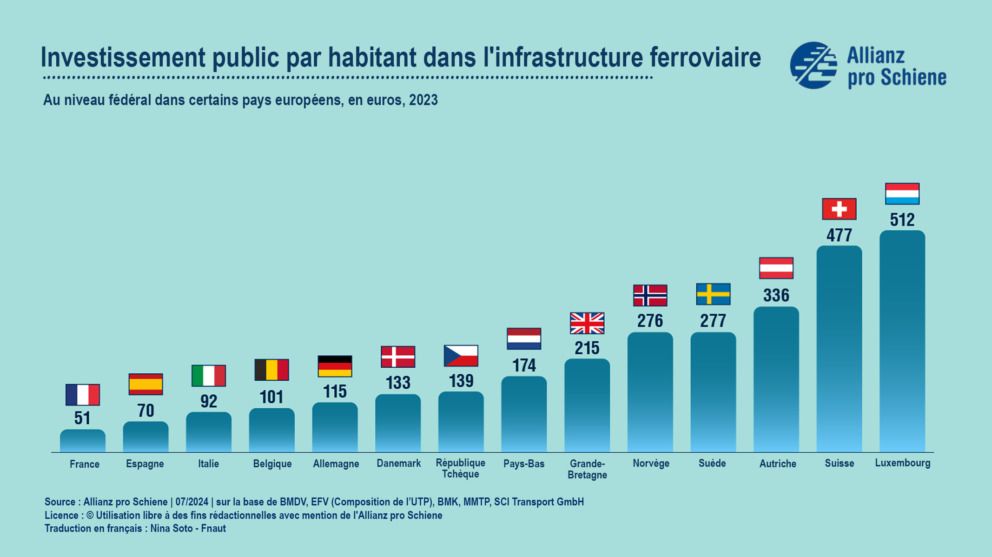
France is last in the ranking of European countries in terms of railway investment.
© Rail Alliance
From railway workers' unions to the lobby of railway companies, including elected officials and users, all stakeholders in the railway world agree at least on one point: public money is sorely lacking in France to deal with the wall of investment necessary to safeguard and develop an aging network. Relentless observation from the German association Alliance for Rail, which published last July a ranking of European countries in terms of railway investment. France appears last.
legend

